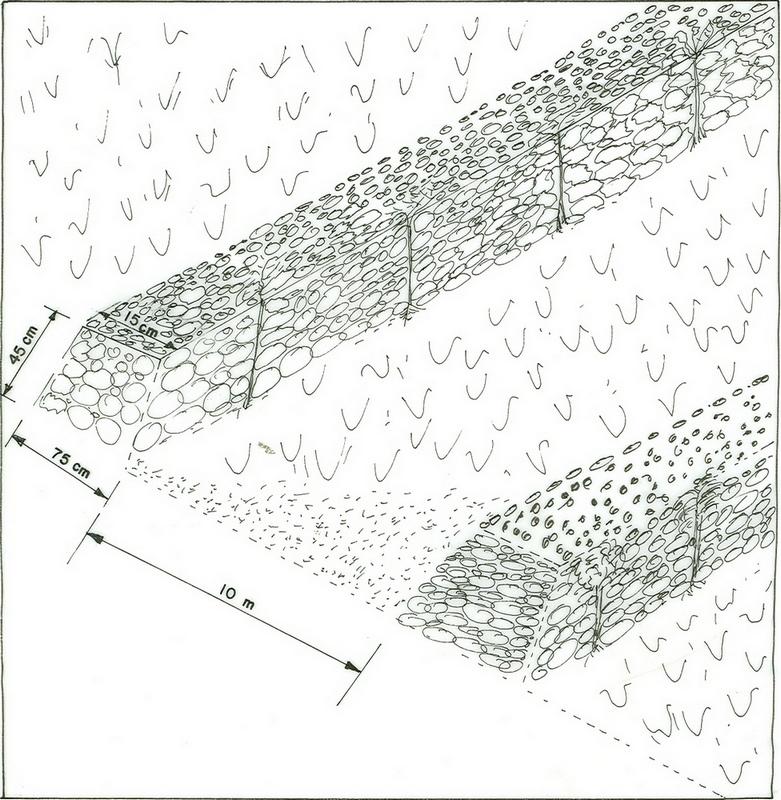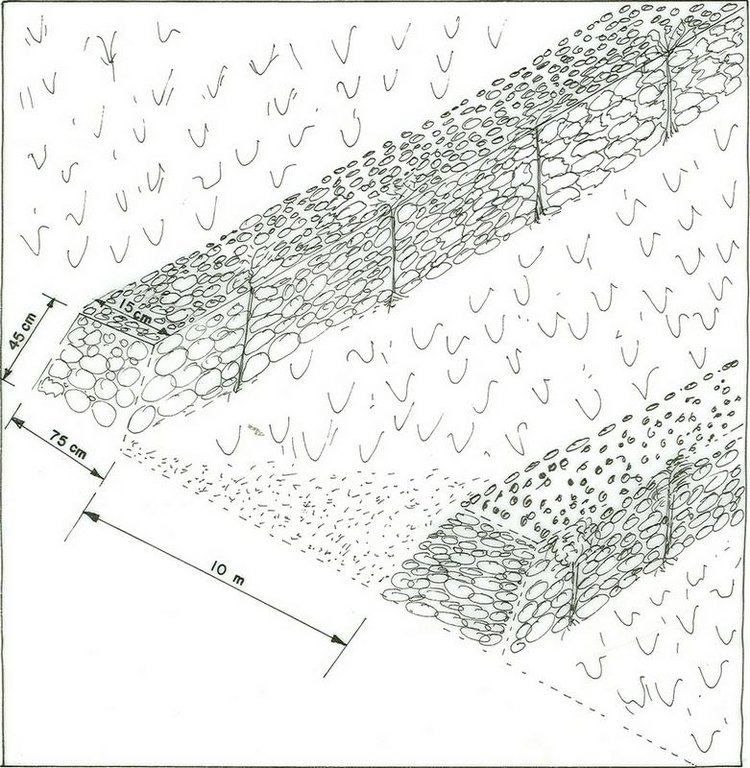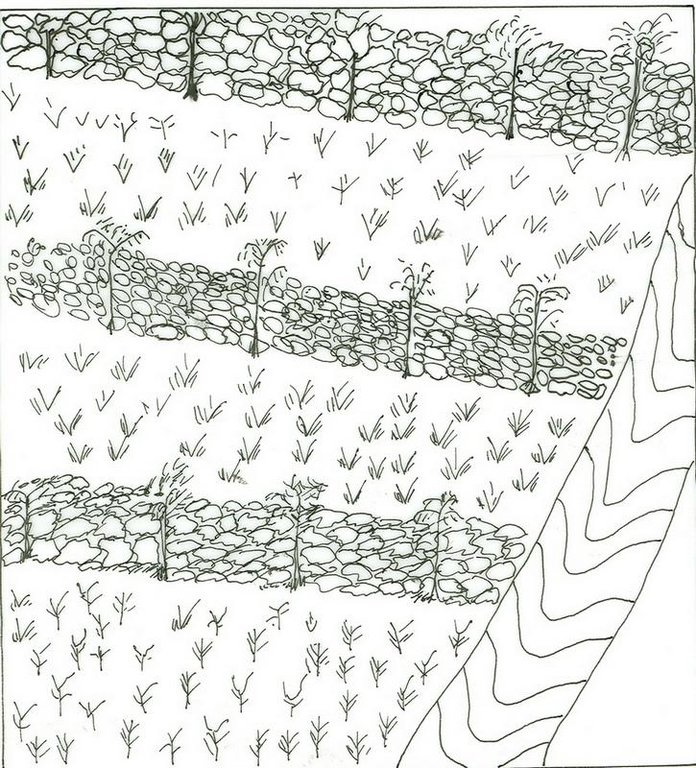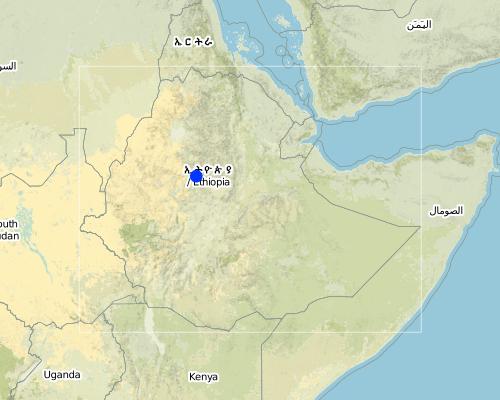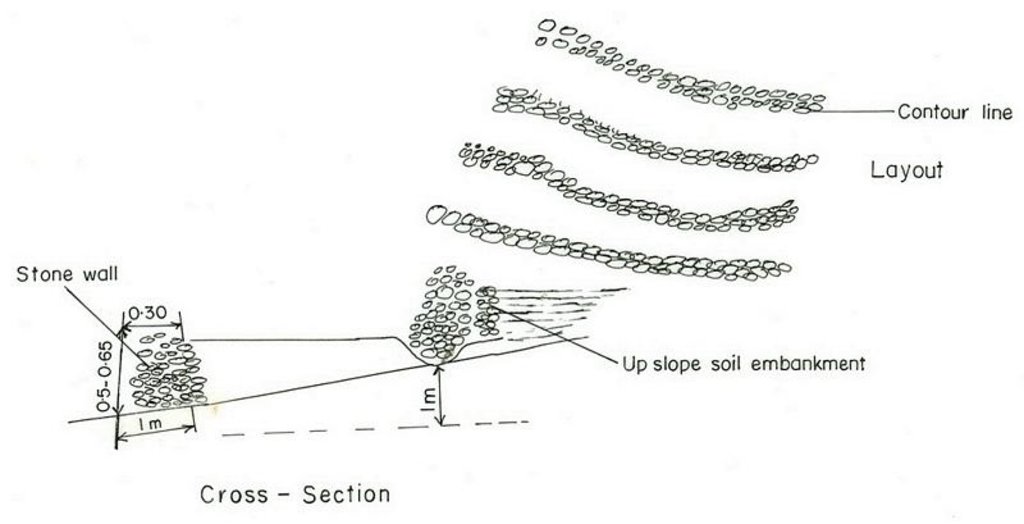Dejen Stone Bund [ប្រទេសអេត្យូពី]
- ការបង្កើត៖
- បច្ចុប្បន្នភាព
- អ្នកចងក្រង៖ Unknown User
- អ្នកកែសម្រួល៖ –
- អ្នកត្រួតពិនិត្យ Fabian Ottiger
Gidad, Irken
technologies_1059 - ប្រទេសអេត្យូពី
ពិនិត្យមើលគ្រប់ផ្នែក
ពង្រីកមើលទាំងអស់ បង្រួមទាំងអស់1. ព័ត៌មានទូទៅ
1.3 លក្ខខណ្ឌទាក់ទងទៅនឹងការប្រើប្រាស់ទិន្នន័យដែលបានចងក្រងតាមរយៈ វ៉ូខេត
តើពេលណាដែលទិន្នន័យបានចងក្រង (នៅទីវាល)?
10/10/2005
អ្នកចងក្រង និង(បុគ្គលសំខាន់ៗ)យល់ព្រមទទួលយកនូវលក្ខខណ្ឌនានាទាក់ទងទៅនឹងការប្រើប្រាស់ទិន្នន័យដែលបានចងក្រងតាមរយៈវ៉ូខេត:
បាទ/ចា៎
2. ការពណ៌នាពីបច្ចេកទេស SLM
2.1 ការពណ៌នាដោយសង្ខេបពីបច្ចេកទេស
និយមន័យបច្ចេកទេស:
Stone bund is an enbankment of stone constructed acrros the slope following the contour.
2.2 ការពណ៌នាលម្អិតពីបច្ចេកទេស
ការពណ៌នា:
It is a stone wall stablized with grasses and fodder plant species. Its main purpose is moisture harvesting and soil erosion control. Establishment is made first by laying out contour lines, digging foundation and placing of stones in a manner to interlock to each other. Stone bunds placed on contour are known as level stone bunds. The purpose is to arrest runoff and enhance soil moisture to increaseavailability of water to plants. It is also aimed at controlling soil erosion from cultivated fields such that the plants have sufficient soil depth to establish and grow. Maintenance is done every year especially before thev rains. Maintenance continues for several years until the slope of the terraced land forms nearly level bench or slightly sloping outward terrace. The technology is suitable to semi-arid and arid climatic conditions having steep to very steep cultivated lands. It is suitable to major annual cereal crops, perennial crops, fruit trees and cash crops.
2.3 រូបភាពនៃបច្ចេកទេស
2.5 ប្រទេស/តំបន់/ទីតាំងកន្លែង ដែលបច្ចេកទេសត្រូវបានអនុវត្ត និងបានគ្រប់ដណ្តប់ដោយការវាយតម្លៃនេះ
ប្រទេស:
ប្រទេសអេត្យូពី
តំបន់/រដ្ឋ/ខេត្ត:
Amhara/Dejen
បញ្ជាក់បន្ថែមពីលក្ខណៈនៃទីតាំង:
Dejen-Inemay
Map
×2.6 កាលបរិច្ឆេទនៃការអនុវត្ត
ប្រសិនបើមិនច្បាស់ឆ្នាំ សូមបញ្ជាក់កាលបរិច្ឆេទដែលប្រហាក់ប្រហែល:
- តិចជាង 10ឆ្នាំមុន (ថ្មី)
2.7 ការណែនាំពីបច្ចេកទេស
សូមបញ្ជាក់តើបច្ចេកទេសត្រូវបានណែនាំឱ្យអនុវត្តដោយរបៀបណា:
- តាមរយៈគម្រោង / អន្តរាគមន៍ពីខាងក្រៅ
មតិយោបល់ (ប្រភេទនៃគម្រោង ។ល។):
Originally it is indiginous and now some improvement techniques have been included.
3. ចំណាត់ថ្នាក់នៃបច្ចេកទេស SLM
3.1 គោលបំណងចម្បង (១ ឬច្រើន) នៃបច្ចេកទេសនេះ
- ធ្វើឱ្យប្រសើរឡើងនូវផលិតកម្ម
- កាត់បន្ថយ, បង្ការ, ស្តារឡើងវិញនូវការធ្លាក់ចុះគុណភាពដី
3.2 ប្រភេទដីប្រើប្រាស់មួយប្រភេទ (ច្រើនប្រភេទ) ដែលបានអនុវត្តបច្ចេកទេស

ដីដាំដំណាំ
- ដំណាំប្រចាំឆ្នាំ
ដំណាំចម្បង (ដំណាំកសិ-ឧស្សាហកម្ម និងដំណាំស្បៀង) :
Major food crop annual cropping: sorghum
Major cash crop perennial (non-woody) cropping: sugar cane, fruit trees
មតិយោបល់:
Major land use problems (compiler’s opinion): Overgrazing with little vegetation cover and exposed surface, cultivating on very steep slopes.
Major land use problems (land users’ perception): Low productivity of land, erosion, low soil fertility and surface stoniness.
Type of cropping system and major crops comments: sorghum-teff-sorghum
3.3 ព័ត៌មានបន្ថែមអំពីអ្នកប្រើប្រាស់ដី
ការផ្គត់ផ្គង់ទឹកនៅកន្លែងអនុវត្តបច្ចេកទេស:
- ទឹកភ្លៀង
មតិយោបល់:
Water supply: Also mixed rainfed - irrigated
ចំនួនសារដែលដាំដំណាំក្នុងមួយឆ្នាំ:
- 1
សូមបញ្ជាក់:
Longest growing period in days: 210
3.4 ក្រុម SLM ដែលបច្ចេកទេសស្ថិតនៅក្នុង
- វិធានការអនុវត្តកាត់ទទឹងទីជម្រាល
3.5 ការសាយភាយនៃបច្ចេកទេស
មតិយោបល់:
Total area covered by the SLM Technology is 10 m2.
The technology is applied mostly on the low land part of the woreda.
3.6 វិធានការ SLM ដែលបញ្ចូលនូវបច្ចេកទេស
3.7 កំណត់ប្រភេទនៃការធ្លាក់ចុះគុណភាពដីសំខាន់ៗដែលបច្ចេកទេសនេះបានដោះស្រាយ

ការហូរច្រោះដីដោយសារទឹក
- Wt: ការបាត់ដីស្រទាប់លើដោយការហូរច្រោះ
- Wg: ការកកើតឡើងនូវកំទេចកំទីដីស្រទាប់ក្រោម
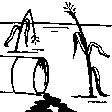
ការធ្លាក់ចុះសារធាតុគីមីក្នុងដី
- Cn: ការថយចុះជីជាតិ និងកាត់បន្ថយបរិមាណសារធាតុសរីរាង្គ (មិនកើតឡើងដោយការហូរច្រោះទេ)
មតិយោបល់:
Main type of degradation addressed: Wt: loss of topsoil / surface erosion
Secondary types of degradation addressed: Wg: gully erosion / gullying, Cn: fertility decline and reduced organic matter content
3.8 ការពារ កាត់បន្ថយ ឬស្តារឡើងវិញនៃការធ្លាក់ចុះគុណភាពដី
បញ្ជាក់ពីគោលដៅរបស់បច្ចេកទេស ដែលផ្តោតទៅការធ្លាក់ចុះគុណភាពដី:
- ការកាត់បន្ថយការធ្លាក់ចុះគុណភាពដី
មតិយោបល់:
Secondary goals: prevention of land degradation, rehabilitation / reclamation of denuded land
4. បច្ចេកទេសជាក់លាក់ សកម្មភាពអនុវត្ត ធាតុចូល និងថ្លៃដើម
4.1 គំនូសបច្ចេកទេសនៃបច្ចេកទេសនេះ
4.2 លក្ខណៈពិសេសនៃបច្ចេកទេស/ ពណ៌នាពីគំនូរបច្ចេកទេស
Amhara
Technical knowledge required for field staff / advisors: moderate
Technical knowledge required for land users: moderate
Main technical functions: control of dispersed runoff: retain / trap
Secondary technical functions: reduction of slope angle, reduction of slope length, increase of infiltration, water harvesting / increase water supply
Better crop cover
Material/ species: Sorghum, Teff, Suflower
Remarks: broad cast
Contour planting / strip cropping
Material/ species: Sesbania, leucaena
Remarks: by planting across the slope
Agronomic measure: removing less vegetation cover
Material/ species: Crop residue, grasses
Remarks: across the slope
Mineral (inorganic) fertilizers
Material/ species: DAP/Urea
Quantity/ density: 150 Kg/ha
Remarks: Sown by broadcasting
Contour tillage
Remarks: oxen plough
Pits
Remarks: hand pick axe
Aligned: -contour
Vegetative material: T : trees / shrubs
Number of plants per (ha): 1500
Vertical interval between rows / strips / blocks (m): 1m
Spacing between rows / strips / blocks (m): 5 m
Vertical interval within rows / strips / blocks (m): 1m
Width within rows / strips / blocks (m): 2m
Scattered / dispersed
Vegetative material: T : trees / shrubs
Number of plants per (ha): 500
Spacing between rows / strips / blocks (m): 5m
Width within rows / strips / blocks (m): 10m
Trees/ shrubs species: sesbania
Grass species: local
Slope (which determines the spacing indicated above): 15.00%
If the original slope has changed as a result of the Technology, the slope today is (see figure below): 10.00%
Gradient along the rows / strips: 0.00%
Bund/ bank: level
Vertical interval between structures (m): 2m
Spacing between structures (m): 10m
Height of bunds/banks/others (m): 0.45m
Width of bunds/banks/others (m): 0.45m
Length of bunds/banks/others (m): 80m
Structural measure: diversion ditch / cut-off drain
Depth of ditches/pits/dams (m): 0.4m
Width of ditches/pits/dams (m): 0.3m
Length of ditches/pits/dams (m): 58m
Height of bunds/banks/others (m): 0.75m
Width of bunds/banks/others (m): 1.0m
Length of bunds/banks/others (m): 58m
Construction material (earth): reinforce the stone embankment
Construction material (stone): strengthen/support the terrace wall
Slope (which determines the spacing indicated above): 15%
If the original slope has changed as a result of the Technology, the slope today is: 10%
Lateral gradient along the structure: 0%
Vegetation is used for stabilisation of structures.
Other type of management: change of management / intensity level - from random/open access to controlled system
4.3 ព័ត៌មានទូទៅដែលពាក់ព័ន្ធនឹងការគណនាធាតុចូល និងថ្លៃដើម
ផ្សេងៗ/ រូបិយប័ណ្ណជាតិ (បញ្ជាក់):
Birr
កំណត់អត្រាប្តូរប្រាក់ពីដុល្លាទៅរូបិយប័ណ្ណតំបន់ (បើទាក់ទង)៖ 1 ដុល្លារ =:
8,6
កំណត់ថ្លៃឈ្នួលជាមធ្យមនៃការជួលកម្លាំងពលកម្មក្នុងមួយថ្ងៃ:
0.70
4.4 សកម្មភាពបង្កើត
| សកម្មភាព | ប្រភេទវិធានការ | ពេលវេលា | |
|---|---|---|---|
| 1. | preparation of seedlings | សារពើរុក្ខជាតិ | dry season |
| 2. | transporting of seedlings | សារពើរុក្ខជាតិ | rainy season |
| 3. | plantation on bund | សារពើរុក្ខជាតិ | rainy season |
| 4. | surveying | រចនាសម្ព័ន្ធ | dry season |
| 5. | collecting of stones | រចនាសម្ព័ន្ធ | dry season |
| 6. | constructing the bund | រចនាសម្ព័ន្ធ | dry season |
| 7. | Seek solution for the management problems | ការគ្រប់គ្រង | before harvesting |
| 8. | controlling the development activities by guarding from free grazing animals. | ការគ្រប់គ្រង | after harvesting |
| 9. | discussing on management and measures | ការគ្រប់គ្រង | before harvesting |
4.5 ថ្លៃដើម និងធាតុចូលដែលត្រូវការសម្រាប់ការបង្កើតបច្ចេកទេស
| បញ្ជាក់ពីធាតុចូល | ឯកតា | បរិមាណ | ថ្លៃដើមក្នុងមួយឯកតា | ថ្លៃធាតុចូលសរុប | % នៃថ្លៃដើមដែលចំណាយដោយអ្នកប្រើប្រាស់ដី | |
|---|---|---|---|---|---|---|
| កម្លាំងពលកម្ម | Labour | ha | 1,0 | 236,0 | 236,0 | 100,0 |
| សម្ភារៈ | Tools | ha | 1,0 | 6,0 | 6,0 | 100,0 |
| សម្ភារៈដាំដុះ | Seedlings | ha | 1,0 | 58,0 | 58,0 | 100,0 |
| សម្ភារៈសាងសង់ | Stone | ha | 1,0 | 83,0 | 83,0 | 100,0 |
| ថ្លៃដើមសរុបក្នុងការបង្កើតបច្ចេកទេស | 383,0 | |||||
មតិយោបល់:
Duration of establishment phase: 24 month(s)
4.6 សកម្មភាពថែទាំ
| សកម្មភាព | ប្រភេទវិធានការ | ពេលវេលា/ ភាពញឹកញាប់ | |
|---|---|---|---|
| 1. | Contour ploughing | ក្សេត្រសាស្ត្រ | dry season / three times |
| 2. | Harrowing | ក្សេត្រសាស្ត្រ | dry season / one time |
| 3. | Planting | ក្សេត្រសាស្ត្រ | wet season / one time |
| 4. | Temporary trashline | ក្សេត្រសាស្ត្រ | dry -rainy season / |
| 5. | Residues | ក្សេត្រសាស្ត្រ | dry season / many times |
| 6. | Weeding | ក្សេត្រសាស្ត្រ | rainy season / two times |
| 7. | Harvest | ក្សេត្រសាស្ត្រ | dry season / annual |
| 8. | cutting/prunnig | សារពើរុក្ខជាតិ | dry season /after and befor cropping |
| 9. | repair breaks | រចនាសម្ព័ន្ធ | dry season/annually |
4.7 កំណត់ថ្លៃដើមសម្រាប់ការថែទាំ/ សកម្មភាពរបស់បច្ចេកទេស (ក្នុងរយៈពេលមួយឆ្នាំ)
| បញ្ជាក់ពីធាតុចូល | ឯកតា | បរិមាណ | ថ្លៃដើមក្នុងមួយឯកតា | ថ្លៃធាតុចូលសរុប | % នៃថ្លៃដើមដែលចំណាយដោយអ្នកប្រើប្រាស់ដី | |
|---|---|---|---|---|---|---|
| កម្លាំងពលកម្ម | Labour | ha | 1,0 | 30,0 | 30,0 | 100,0 |
| សម្ភារៈដាំដុះ | Seedlings | ha | 1,0 | 30,0 | 30,0 | 100,0 |
| សម្ភារៈសាងសង់ | Stone | ha | 1,0 | 12,0 | 12,0 | 100,0 |
| ថ្លៃដើមសរុបសម្រាប់ការថែទាំដំណាំតាមបច្ចេកទេស | 72,0 | |||||
មតិយោបល់:
Machinery/ tools: hoe, sickle, axe, pad, spane
length of structure per ha of land protected
4.8 កត្តាសំខាន់បំផុតដែលមានឥទ្ធិពលដល់ការចំណាយ
ពណ៌នាពីកត្តាប៉ះពាល់ចម្បងៗទៅលើថ្លៃដើម:
slope, soil depth
5. លក្ខណៈបរិស្ថានធម្មជាតិ និងមនុស្ស
5.1 អាកាសធាតុ
បរិមាណទឹកភ្លៀងប្រចាំឆ្នាំ
- < 250 មម
- 251-500 មម
- 501-750 មម
- 751-1,000 មម
- 1,001-1,500 មម
- 1,501-2,000 មម
- 2,001-3,000 មម
- 3,001-4,000 មម
- > 4,000 មម
តំបន់កសិអាកាសធាតុ
- មានភ្លៀងមធ្យម
5.2 សណ្ឋានដី
ជម្រាលជាមធ្យម:
- រាបស្មើ (0-2%)
- ជម្រាលតិចតួច (3-5%)
- មធ្យម (6-10%)
- ជម្រាលខ្ពស់បន្តិច (11-15%)
- ទីទួល (16-30%)
- ទីទួលចោត (31-60%)
- ទីទួលចោតខ្លាំង (>60%)
ទម្រង់ដី:
- ខ្ពង់រាប
- កំពូលភ្នំ
- ជម្រាលភ្នំ
- ជម្រាលទួល
- ជម្រាលជើងភ្នំ
- បាតជ្រលងភ្នំ
តំបន់តាមរយៈកម្ពស់ :
- 0-100 ម
- 101-500 ម
- 501-1,000 ម
- 1,001-1,500 ម
- 1,501-2,000 ម
- 2,001-2,500 ម
- 2,501-3,000 ម
- 3,001-4,000 ម
- > 4,000 ម
មតិយោបល់ និងបញ្ចាក់បន្ថែមអំពីសណ្ឋានដី :
Slopes on average: Hilly (mostly terraced by stone bunds). Also rolling (ranked 2) and steep (ranked 3)
5.3 ដី
ជម្រៅដីជាមធ្យម:
- រាក់ខ្លាំង (0-20 សម)
- រាក់ (21-50 សម)
- មធ្យម (51-80 សម)
- ជ្រៅ (81-120 សម)
- ជ្រៅខ្លាំង (> 120 សម)
វាយនភាពដី (ស្រទាប់លើ):
- គ្រើម/ មានពន្លឺ (ខ្សាច់)
សារធាតុសរីរាង្គនៅស្រទាប់ដីខាងលើ:
- ទាប (<1%)
បើអាចសូមភ្ជាប់ការពណ៌នាពីដីឱ្យបានច្បាស់ ឬព័ត៌មានដែលអាចទទួលបាន ឧ. ប្រភេទដី, pH ដី/ ជាតិអាស៊ីត, សមត្ថភាពផ្លាស់ប្តូរកាចុង, វត្តមាននីត្រូសែន, ភាពប្រៃ ។ល។:
Soil fertility is low-very low
Soil drainage/ infiltration is good-medium
Soil water storage capacity is low-very low
5.6 លក្ខណៈនៃអ្នកប្រើប្រាស់ដីដែលអនុវត្តបច្ចេកទេស
ទីផ្សារនៃប្រព័ន្ធផលិតកម្ម:
- សម្រាប់ហូបក្នុងគ្រួសារ (ផ្គត់ផ្គង់ខ្លួនឯង)
ចំណូលក្រៅកសិកម្ម:
- តិចជាង 10% នៃចំណូល
កម្រិតជីវភាព:
- មិនល្អខ្លាំង
- មិនល្អ
កម្រិតប្រើប្រាស់គ្រឿងយន្ត:
- ប្រើកម្លាំងពលកម្ម
- ប្រើកម្លាំងសត្វ
សូមបញ្ជាក់ពីលក្ខណៈពាក់ព័ន្ធផ្សេងទៀតអំពីអ្នកប្រើប្រាស់ដី:
Population density: 50-100 persons/km2
Annual population growth: 2% - 3%
and own 50% of the land.
and own 40% of the land.
and own 10% of the land.
Off-farm income specification: In the land with proper conservation techniques the productivity increased by about two folds whereas the land with out conservation measures yield is seen to decrease
5.7 ទំហំផ្ទៃដីជាមធ្យមនៃដីផ្ទាល់ខ្លួន ឬជួលគេដែលបានអនុវត្តបច្ចេកទេស
- < 0.5 ហិកតា
- 0.5-1 ហិកតា
- 1-2 ហិកតា
- 2-5 ហិកតា
- 5-15 ហិកតា
- 15-50 ហិកតា
- 50-100 ហិកតា
- 100-500 ហិកតា
- 500-1,000 ហិកតា
- 1,000-10,000 ហិកតា
- > 10,000 ហិកតា
មតិយោបល់:
Grazing land: Far away from homesteads.
5.8 ភាពជាម្ចាស់ដី កម្មសិទ្ធប្រើប្រាស់ដី និងកម្មសិទ្ធប្រើប្រាស់ទឹក
ភាពជាម្ចាស់ដី:
- រដ្ឋ
6. ផលប៉ះពាល់ និងការសន្និដ្ឋាន
6.1 ផលប៉ះពាល់ក្នុងបរិវេណអនុវត្តបច្ចេកទេសដែលកើតមាន
ផលប៉ះពាល់លើសេដ្ឋកិច្ចសង្គម
ផលិតផល
ផលិតកម្មដំណាំ
ផលិតកម្មចំណីសត្វ
មតិយោបល់/ ការបញ្ជាក់:
Due to bund plantation
គុណភាពចំណីសត្វ
មតិយោបល់/ ការបញ្ជាក់:
Due to bund plantation
ផ្ទៃដីផលិតកម្ម
មតិយោបល់/ ការបញ្ជាក់:
The loss is only for the first two years
ចំណូល និងថ្លៃដើម
ចំណូលក្នុងកសិដ្ឋាន
ផលប៉ះពាល់ទៅលើវប្បធម៌សង្គម
ស្ថាប័នសហគមន៍
ការកាត់បន្ថយជម្លោះ
មតិយោបល់/ ការបញ្ជាក់:
Because of placements of cutoff drains
ផលប៉ះពាល់ទៅលើអេកូឡូស៊ី
វដ្តទឹក/លំហូរ
ប្រព័ន្ធបង្ហូរទឹក
ដី
គម្របដី
6.2 ផលប៉ះពាល់ក្រៅបរិវេណអនុវត្តបច្ចេកទេសដែលកើតមាន
ទឹកជំនន់ខ្សែទឹកខាងក្រោម
មតិយោបល់/ ការបញ្ជាក់:
Sediment trapped on the bunds
6.4 ការវិភាគថ្លៃដើម និងអត្ថប្រយោជន៍
តើផលចំណេញ និងថ្លៃដើមត្រូវបានប្រៀបធៀបគ្នាយ៉ាងដូចម្តេច (ទស្សនៈរបស់អ្នកប្រើប្រាស់ដី)?
រយៈពេលខ្លី:
អវិជ្ជមាន
រយៈពេលវែង:
វិជ្ជមានតិចតួច
តើផលចំណេញ និងការថែទាំ/ ជួសជុលត្រូវបានប្រៀបធៀបគ្នាយ៉ាងដូចម្តេច (ទស្សនៈរបស់អ្នកប្រើប្រាស់ដី)?
រយៈពេលខ្លី:
អវិជ្ជមានតិចតួច
រយៈពេលវែង:
វិជ្ជមានតិចតួច
6.5 ការទទួលយកបច្ចេកទេស
ក្នុងចំណោមគ្រួសារទាំងអស់ដែលអនុវត្តបច្ចេកទេស តើមានប៉ុន្មានគ្រួសារដែលចង់ធ្វើដោយខ្លួនឯង ដោយមិនទទួលបានសម្ភារៈលើកទឹកចិត្ត/ប្រាក់ឧបត្ថម្ភ?:
- 90-100%
មតិយោបល់:
320 land user families have adopted the Technology without any external material support
Comments on spontaneous adoption: estimates
There is a moderate trend towards spontaneous adoption of the Technology
Comments on adoption trend: Farmers in the near by village are gradually adopting good lessons learnet from farmers who have implemented the technology. As a result the technology is expanding in the area.
6.7 ភាពខ្លាំង/ គុណសម្បត្តិ/ ឱកាសនៃបច្ចេកទេស
| ភាពខ្លាំង/ គុណសម្បត្តិ/ ឱកាសនៅកន្លែងរបស់អ្នកប្រើប្រាស់ដី |
|---|
|
The soil stablizes because of bund plantation How can they be sustained / enhanced? maintenance and proper management needed. |
| ភាពខ្លាំង/ គុណសម្បត្តិ/ ឱកាស ទស្សនៈរបស់បុគ្គលសំខាន់ៗ |
|---|
|
reduction of slope How can they be sustained / enhanced? frequent maintenance and avoid free grazing |
|
increase soil depth How can they be sustained / enhanced? frequent maintenance and avoid free grazing |
6.8 ភាពខ្សោយ/ គុណវិបត្តិ/ ហានិភ័យនៃបច្ចេកទេស និងវិធីសាស្ត្រដោះស្រាយ
| ភាពខ្សោយ/ គុណវិបត្តិ/ ហានិភ័យ ទស្សនៈរបស់អ្នកប្រើប្រាស់ដី | តើបច្ចេកទេសទាំងនោះបានដោះស្រាយបញ្ហាដូចម្តេច? |
|---|---|
| Loss of land for few years | Make bund area productive |
| ភាពខ្សោយ/ គុណវិបត្តិ/ ហានិភ័យ ទស្សនៈរបស់អ្នកចងក្រងឬបុគ្គលសំខាន់ៗ | តើបច្ចេកទេសទាំងនោះបានដោះស្រាយបញ្ហាដូចម្តេច? |
|---|---|
| Conflicts | discussion and reaching agreements |
7. ឯកសារយោង និងវេបសាយ
7.2 ឯកសារយោងដែលបានចេញផ្សាយ
ចំណងជើង អ្នកនិពន្ធ ឆ្នាំ ISBN:
monthly, quarterly and annual acheivment report of the woreda
ចំណងជើង អ្នកនិពន្ធ ឆ្នាំ ISBN:
work norm
ចំណងជើង អ្នកនិពន្ធ ឆ្នាំ ISBN:
Soil map: assistance for land use planning and regulatory department.
ការតភ្ជាប់ និងម៉ូឌុល
ពង្រីកមើលទាំងអស់ បង្រួមទាំងអស់ការតភ្ជាប់
គ្មានការតភ្ជាប់
ម៉ូឌុល
គ្មានម៉ូឌុល


